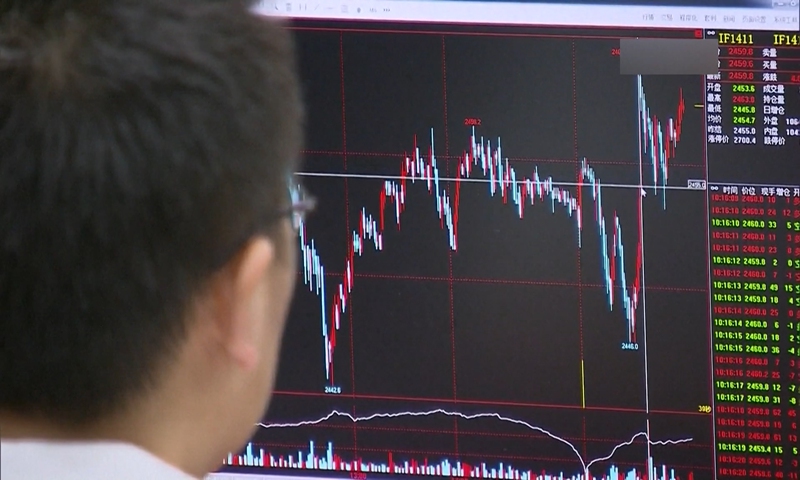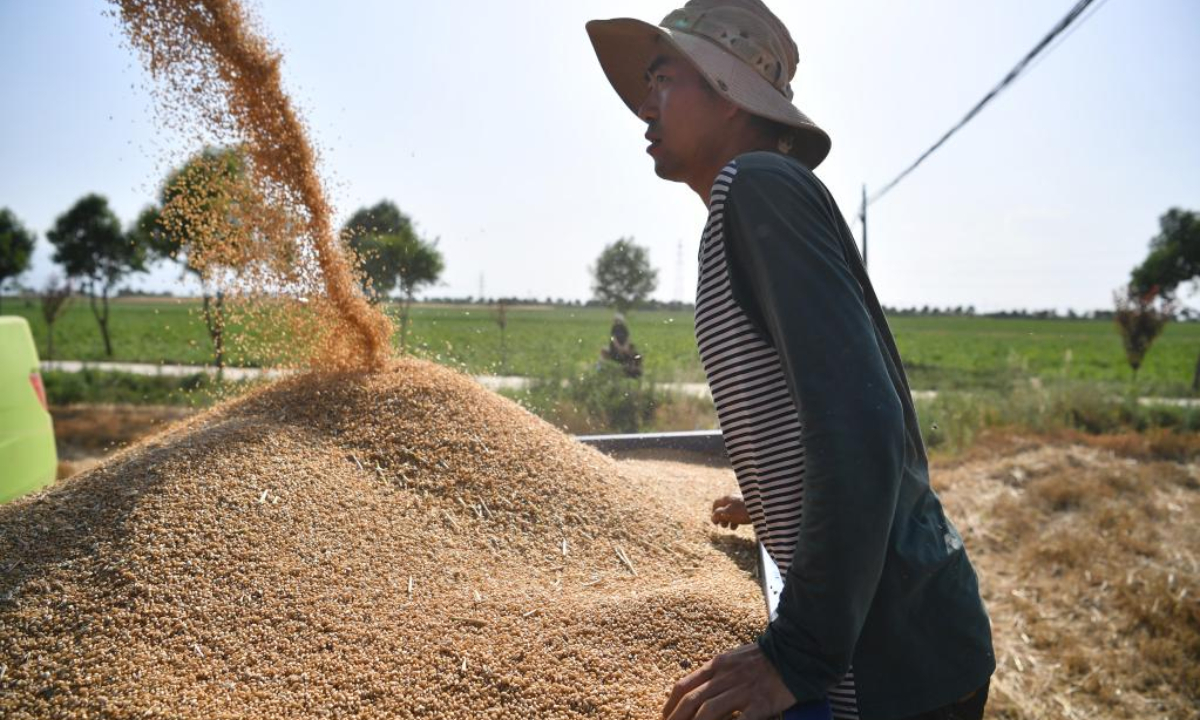You are using an out of date browser. It may not display this or other websites correctly.
You should upgrade or use an alternative browser.
You should upgrade or use an alternative browser.
Chinese Economics Thread
- Thread starter Norfolk
- Start date
broadsword
Brigadier
Pretty much, yes.
Definitely not as much
Sure, Chinese trade "coercion" is "limited"....yet Aust and Lith keep bitching about it....LOL
Chinese stocks surge, defying trend of US-triggered global stock selloff
By Global Times Published: Jun 14, 2022 06:15 PM

A trader follows the trend of the stock market File photo: VCG
Chinese mainland's A-share markets ended higher on Tuesday, marking an unexpected reversal in the face of a bleak picture on US stock markets on Monday, which has cast a shadow over stock markets around the world.
The Shanghai Composite Index rose by 1.02 percent at closing, while the Shenzhen market was up 0.20 percent. The ChiNext gauge of smaller companies in Shenzhen also increased by 0.07 percent.
Affected by the sharp drop in the external market overnight, Chinese mainland shares opened lower Tuesday morning. After the opening, the decline of major indexes further deepened, with chips, gaming and education shares leading the plunge.
But the A-share market staged a sharp reversal near the end of the session, with brokerage sector becoming the biggest contributor to the index reversal. Auto, oil and gas shares also led the rebound.
Analysts said the relatively independent growth trend shows resilience in the A-share market, and behind the market strength is the increase in investor confidence in the country's economic prospects with the easing of credit conditions and accelerated resumption of work and production
Overnight, Wall Street's S&P 500 tumbled by 3.9 percent to a new low this year in what overseas media described as entering a bear market, the Dow Jones fell more than 875 points, or 2.8 percent, and the Nasdaq slid 4.7 percent.
The tumble was an instant reaction to the news that the surging inflation in the US is yet to peak, which, according to some media reports, could prompt the US Federal Reserve to raise the short-term interest rate by three-quarters of a percentage point on Wednesday.
Experts said that US stock volatility in the face of inflationary pressure may affect A shares both good and bad ways.
"On the one hand, it would make global investors look more closely at mainland assets as a safe haven. However, if US stocks drop too much, it would have a spillover impact on Hong Kong market and A-shares as well," Xi Junyang, a professor from the Shanghai University of Finance and Economics, told the Global Times.
manqiangrexue
Brigadier
China actually runs a trade surplus with all of these countries and we don't need to sour that due to hostile polices. Also, the Chinese government earns a raping from taxes which is why Chinese consumers in the US and EU are shocked to find them at less than a third the cost they sell for in China. What we really need to address is not the legality of buying them but instilling pride in the Chinese people so they reject them. If I found a brand new Hermes men's wallet on the street and for some reason I coudn't sell it, I'd kick it to the side and not know or care what it was cus my $6.50 wallet has been working perfectly for over a decade.These expensive products from unfriendly countries should be banned soon.
5G technologies provide new vigor to China's iron and steel industry
Integration of 5G technologies in the industrial internet sector has improved the quality and efficiency of China's iron and steel industry by several notches, especially through the use of big data-based functions such as remote control, collaborative operations, and troubleshooting.
Wuhan Iron and Steel Co. Ltd., a steelmaker in Wuhan, has been one of the companies which successfully leveraged 5G technologies to improve its production processes. Today, the company has a complete set of equipment with advanced production processes for coking, ironing, steel making and steel rolling, among others.
Wu Xiaodi, executive director of Wuhan Iron and Steel, said they have successfully shifted to intelligent manufacturing operations during the past four years.
"Besides real-time monitoring, the management system enables human-machine dialogue and allows workers to give orders to machines. Intelligent logistics and scheduling systems have helped improve the overall level of intelligence. During this process, much of the work previously done by people has been replaced by automation or drone. The advanced tech also came in handy for combating the spread of the pandemic," he said.
According to Wu, the shift has given the steelmaker increased confidence in normal production and pandemic prevention and control.
Wu added that the steelmaker is also exploring more ways to ensure the smooth flow of the entire logistics system. "In this effort, we received strong support from the Hubei provincial government. When we found it difficult to establish contact with our suppliers due to pandemic restrictions, the local government stepped in with coordination efforts."
"If small enterprises are shut down, several support facilities will face supply disruptions, while our production will be hampered. So the government has been actively coordinating to help them resume production, All of these ensure that the supply chain functions smoothly. After the Wuhan experience in 2020, we are now more aware of the importance of smart manufacturing, especially for such sudden and unexpected situations," he said.
Wu said that they are introducing robots to simplify the manufacturing process. The company will add 10,000 robots to replace humans for simple, repetitive and relatively tiring jobs.
"When we use robots in manufacturing, there is more data generated. We are also exploring ways to turn numbers into real assets for our company and tap into the efficiency of the assets, which we call the digital revolution. Our next step is to ensure targeted decision-making through digitalization," added Wu.
China heading for bumper summer harvest ensuring food security: statistics authority
By Global Times Published: Jun 15, 2022 01:51 PM Updated: Jun 15, 2022 01:47 PM

A farmer processes harvested wheat in Zhangxie village of Zhouyuan Township in Chencang District, Baoji City, northwest China's Shaanxi Province on June 8, 2022. Baoji city has carried out the sowing of autumn grain after the harvest of summer grain. Photo:Xinhua
China is expecting a bumper summer harvest this year which will lay a solid foundation for the overall grain production capacity, an official from the Chinese statistics authority told a press conference on Wednesday.
The summer grain harvest is expected to be strong, laying a good foundation for a bumper grain harvest throughout the year, Fu Linghui, a spokesperson from the National Bureau of Statistics said on Wednesday.
He noted that judging from the current situation, the summer grain is expected to achieve a strong harvest this year thanks to overall climatic conditions, scientific and advanced production methods and increased guidance offered to local farmers.
By Tuesday, the country had finished reaping summer harvested wheat equal to 256 million mu (17 million hectares) of farmland, accounting for around 85 percent of the total planting area, the Ministry of Agriculture and Rural Affairs confirmed.
Since the beginning of this year, the intensification of geopolitical conflicts has led to a sharp rise in grain prices. Grain export restrictions from some countries have further exacerbated the tension between supply and demand which has continued to push up global grain prices.
Although international factors such as the Ukraine crisis have pushed up the price of domestic grain, the magnitude is significantly smaller than international levels, Fu said.
In May, China’s consumer price index rose by 2.1 percent from a year earlier, with grain prices shooting up by 3.2 percent year-on-year.
Fu Linghui said that China has placed great importance on food production and security over recent years with its grain output stabilizing at more than 650 billion kilograms for seven consecutive years, with grain stocks relatively abundant.
Among the 33 detailed stimulus measures to support economy released on May 31, the country will issue a second round of 10 billion yuan ($1.48 billion) in subsidies to make up for the decline in grain yields caused by rising costs and lift the minimum purchase price of rice and wheat, two major staple grains consumed by households.
The State Administration of Grain and Reserves (SAGR) estimated on Tuesday that the purchase volume of grains during this year’s the summer season will be around 65 billion kilograms, remaining at a relatively high level.
Given the complicated international environment, Fu said China will continue stepping up efforts to boost grain production capacity with a view to ensure food security, reduce pressure on agricultural production caused by rising prices, and ensure the steady growth in grain output throughout the year.
China’s grain production hit a record 683 billion kilograms in 2021, up 2 percent year on year.

